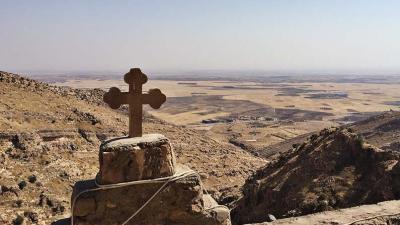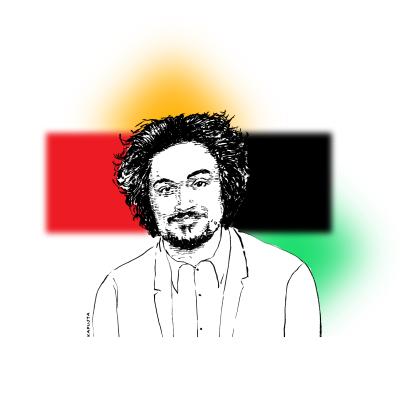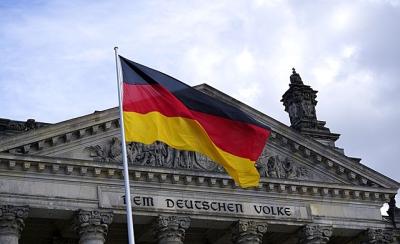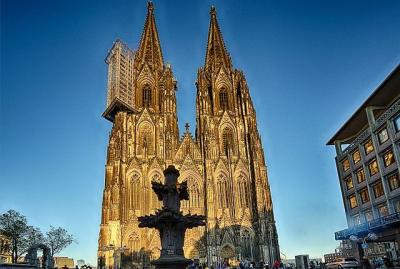Europe will be Christian again, or it will no longer be at all. How Christian it truly is, is also shown by how much it stands by its fellow Christians. In the case of Christianity in the Orient, the very region of origin of the religion that had made Europe what it was and what it is now - things look bleak.
The neutering of occidental politics in favour of universal values and the loss of people’s awareness of their own cultural and religious origins is hardly shown as openly as in the politics towards the Christians of the Middle East. Christian conservatives, however, cannot be left cold by this behaviour for moral or religious reasons alone. It also raises the question of homeland, of a perspective on the countries of origin - and of foreign policy blunders that have enabled Russia, for example, to gain a foothold in the Caucasus and the Middle East.
In the past, France saw itself as the patron of Christians in what was then Ottoman Greece or Ottoman Palestine. Today, the EU does not even have a reference to God in its treaties, and hopes for a secular form of government on a continent whose civilisation would be inconceivable without Christianity. As a result, neither the Christians in the Orient nor the persecuted Christians worldwide have a lobby acting for them, apart from a few Central Eastern European countries which are accused of Christian fanaticism by Brussels.
But the truth is this that those who invoke human rights want to protect everyone at the same time, without exception and with regard to real needs. Without diminishing the suffering of the Rohingya or the Uyghurs: even if the West did not exist, there would still be a strong Islamic community that would be well aware of the dangers their fellow believers are in. In the case of Christians, however, there is no one to look after them. And even worse: in view of the decline of faith in Europe, we certainly should critically question whether these brothers in faith still exist at all. The fact that Christianity is the most persecuted religion in the world remains for many a phrase interpreted relatively in the context of leftist theories of sacrifice. Self-hatred of civilisation is ultimately always also a hatred of Christianity as the nucleus of the Occident.
That the German Christian Democrats are only Christian Democrats in name can be seen from the fact that attempts to give special help to explicitly Christian refugees have been quashed, with the justification everyone must be helped. This relativism is hard to bear. Christians are exposed to greater danger not only in Muslim countries but also on their way to Europe because of Muslim chauvinism. Equating people takes no account of the fact that they may have different needs, and smells of racism or Islamophobia. Such an attitude purports to be Christian under the pretence of wanting to help everyone, but in essence it is not. It is rather a political discourse in which one wants to picture those who demand help primarily for the oppressed Christians as morally biased because they thereby discriminate against all others.
Moreover, the Christian question, especially in the Orient, is not a matter of reception alone. It must be understood by conservative parties that help on the spot is not a mere ruse to reduce the influx from other countries. Rather, a genuine Christian right must be aware that every expulsion from one's homeland is evil; and so the preservation of one's homeland is not only our concern in Europe, but also that of other peoples and countries. Far too often, even conservative politicians speak of economic or cultural reasons. That Christians, for example, must have the opportunity to continue living in countries like Syria or Iraq, since it is their right. The political left always talks about migration enriching our countries - but doesn't that have to mean, conversely, that emigration impoverishes the countries of origin?
Oriental Christians, despite frequent discrimination and exclusion, had taken key positions in the intellectual life and also in the commercial middle classes of many Arab countries. That the hatred of Armenians in the Ottoman Empire manifested itself with the violence of genocide is also due to the positions they held in that state. One myth is that Muslims passed on ancient knowledge before Westerners brought it back to the West; it is true that a not inconsiderable number of the translators were in fact Arab Christians and Jews. According to Rémy Brague, apart from the philosopher Alberuni, no Muslim philosopher of the Middle Ages is known to have learned a non-Islamic language - Avicenna and Averroes included. Like the Christians, the Jews have played a key role in the Orient time and again in recent centuries; and just as the Jews were expelled from almost all Arab states after the founding of the State of Israel, the Christian communities of the Orient are threatened with a very similar fate.
The fact that this is accompanied by a so-called "brain drain" is only one facet of this development. It is characteristic of Europe that, on the one hand, it laments the expulsions and the destruction of pan-European cities and landscapes that have characterised the continent since the age of nationalism. This is true of a port city like Trieste, which had a leading Italian culture but was always marked by the diverse elements of both Slavic and Germanic influences; it is true of Constantinople, which was marked by Turkish-Islamic suzerainty but still had a lively Latin culture at the beginning of the 20th century. It is especially true of a large number of cities and landscapes in Central Eastern Europe and Eastern Europe, not least under the suzerainty of the Austro-Hungarian Dual Monarchy or, as late as the 18th century, under the Polish-Lithuanian Union. The sometimes bloody homogenisation of these cultural areas was seen by the contemporaries as purification, while today people feel a certain nostalgia at the sight of the reminders of other cultures in architecture, cuisine, literature and music. The same Europe that knows and feels those losses acknowledges the same process on the threshold of the Mediterranean with a shrug of shoulders.
That is the cultural dimension. The religious dimension goes further and is more radical. The oldest Christian communities in the world, older than most European city foundations outside Imperium Romanum, are in danger of disappearing forever. Christianity is dying out in its cradle, of all places. Even more: not only radical Muslims, but also woke leftists and secular rightists increasingly often regard those communities as foreign bodies, whether out of Islamic, anti-Christian or anti-colonial resentment or abstruse notions of space. The fact that there are still Christians in Syria who use Aramaic - the language of Jesus - as the church language is not only a signal of a fascinating line of continuity; it is also a signal of what is in danger of disappearing.
But it is not only for reasons of migration and cultural responsibility that conservatives in particular and Europe in general need to concern themselves with the threatened Christianity in the Orient. The reputation of the West has suffered enormously among the Christians of the Middle East and the Caucasus. Without wanting to glorify the regimes in Damascus and Baghdad, one must nevertheless state that Christians used to have a better life under the national and secular leadership of the respective countries. The US intervention in Iraq as well as the support for civil war factions in Syria have created a vacuum which could be invaded by jihadist groups.
The West, especially the US, has thus lost the trust of Christians on the ground several times. It has driven them into the arms of Russia, which intervened in Syria, for example, and was perceived by many as an actual stabiliser. In a very similar way, the EU has completely neglected Armenia's needs in order to conclude gas and oil deals with Azerbaijan, thus opening a new phase in the Nagorno-Karabakh conflict, which Armenia - wedged between Turkey and Azerbaijan - interprets as a struggle for its own existence. How can Armenia be blamed for not breaking away from the Russian embrace when it is being abandoned by everyone else? It simply has no other options when the West prefers to flirt with Ankara and Baku.
To appreciate the foreign policy twilight into which Europe has manoeuvred itself, one only has to acknowledge the fact that even the People's Republic of China now enjoys sympathy of the West - despite being one of the world's biggest persecutors of Christians. The local Christians are so desperate that they welcome any counterweight to Islamic terrorists or Islamic regimes. Armenia is even pinning its hopes on Iran. How many more cries for help will it take for the secularised West to realise its responsibility?
Read also
A green economy minister threatens a touristic nature paradise
Rügen is a place of romantic longing for many Germans. Today, the largest island in the republic has primarily the reputation of a tourist resort, seaside place and nature reserve. And one artistic vision of it remains especially vivid in the German soul: a romantic painting by Caspar David Friedrich, the chalk cliffs in which have etched themselves into our memory.
Marco Gallina
Indiana Jones and the Lost West
Indiana Jones 5 could be a grave for the Hollywood industry. Several films released by that industry have already flopped this year.
Marco Gallina
Country Report: Germany Faces Loss of Prosperity
Despite the economic downturn, citizens are threatened with new taxes and hidden levies, for example through a reform of the heating law or the CO2 tax.
Marco Gallina
The Catholic Church in Germany is in a worse situation than in 1517
The Archbishop of Cologne is one of the most important representatives of the Catholic clergy not only in Germany, but worldwide.














Comments (0)